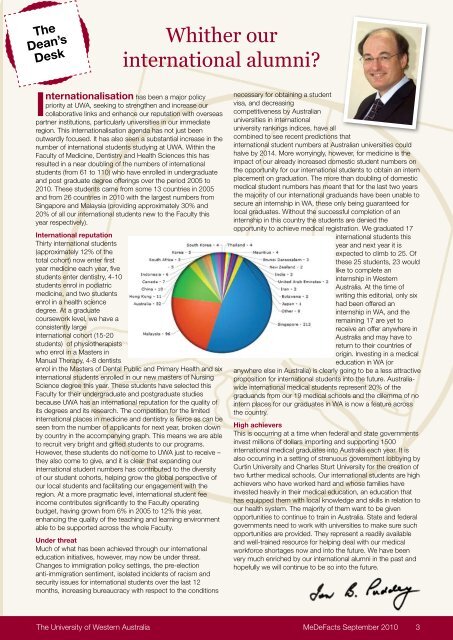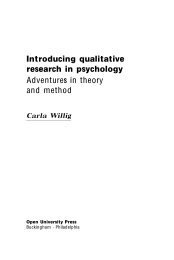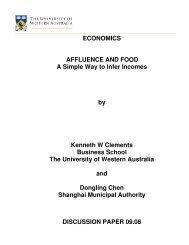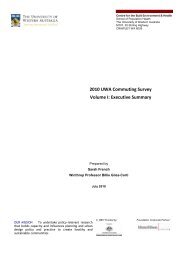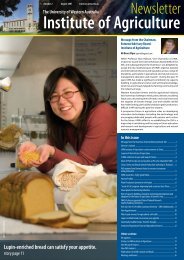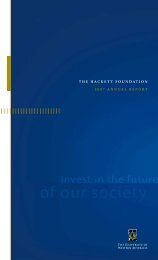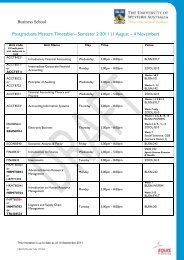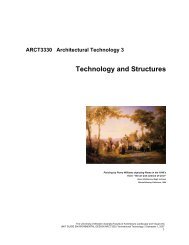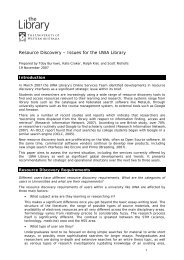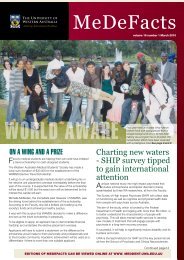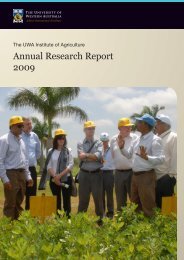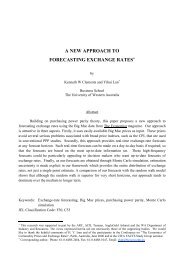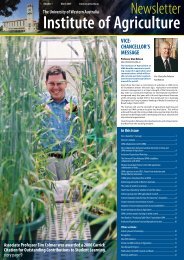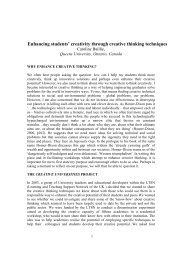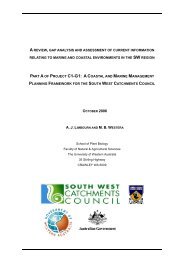MeDeFacts September 2010 - The University of Western Australia
MeDeFacts September 2010 - The University of Western Australia
MeDeFacts September 2010 - The University of Western Australia
You also want an ePaper? Increase the reach of your titles
YUMPU automatically turns print PDFs into web optimized ePapers that Google loves.
the<br />
dean’s<br />
desk<br />
Whither our<br />
international alumni?<br />
internationalisation has been a major policy<br />
priority at UWA, seeking to strengthen and increase our<br />
collaborative links and enhance our reputation with overseas<br />
partner institutions, particularly universities in our immediate<br />
region. This internationalisation agenda has not just been<br />
outwardly focused. It has also seen a substantial increase in the<br />
number <strong>of</strong> international students studying at UWA. Within the<br />
Faculty <strong>of</strong> Medicine, Dentistry and Health Sciences this has<br />
resulted in a near doubling <strong>of</strong> the numbers <strong>of</strong> international<br />
students (from 61 to 110) who have enrolled in undergraduate<br />
and post graduate degree <strong>of</strong>ferings over the period 2005 to<br />
<strong>2010</strong>. <strong>The</strong>se students came from some 13 countries in 2005<br />
and from 26 countries in <strong>2010</strong> with the largest numbers from<br />
Singapore and Malaysia (providing approximately 30% and<br />
20% <strong>of</strong> all our international students new to the Faculty this<br />
year respectively).<br />
international reputation<br />
Thirty international students<br />
(approximately 12% <strong>of</strong> the<br />
total cohort) now enter first<br />
year medicine each year, five<br />
students enter dentistry, 4-10<br />
students enrol in podiatric<br />
medicine, and two students<br />
enrol in a health science<br />
degree. At a graduate<br />
coursework level, we have a<br />
consistently large<br />
international cohort (15-20<br />
students) <strong>of</strong> physiotherapists<br />
who enrol in a Masters in<br />
Manual <strong>The</strong>rapy, 4-8 dentists<br />
enrol in the Masters <strong>of</strong> Dental Public and Primary Health and six<br />
international students enrolled in our new masters <strong>of</strong> Nursing<br />
Science degree this year. <strong>The</strong>se students have selected this<br />
Faculty for their undergraduate and postgraduate studies<br />
because UWA has an international reputation for the quality <strong>of</strong><br />
its degrees and its research. <strong>The</strong> competition for the limited<br />
international places in medicine and dentistry is fierce as can be<br />
seen from the number <strong>of</strong> applicants for next year, broken down<br />
by country in the accompanying graph. This means we are able<br />
to recruit very bright and gifted students to our programs.<br />
However, these students do not come to UWA just to receive –<br />
they also come to give, and it is clear that expanding our<br />
international student numbers has contributed to the diversity<br />
<strong>of</strong> our student cohorts, helping grow the global perspective <strong>of</strong><br />
our local students and facilitating our engagement with the<br />
region. At a more pragmatic level, international student fee<br />
income contributes significantly to the Faculty operating<br />
budget, having grown from 6% in 2005 to 12% this year,<br />
enhancing the quality <strong>of</strong> the teaching and learning environment<br />
able to be supported across the whole Faculty.<br />
under threat<br />
Much <strong>of</strong> what has been achieved through our international<br />
education initiatives, however, may now be under threat.<br />
Changes to immigration policy settings, the pre-election<br />
anti-immigration sentiment, isolated incidents <strong>of</strong> racism and<br />
security issues for international students over the last 12<br />
months, increasing bureaucracy with respect to the conditions<br />
necessary for obtaining a student<br />
visa, and decreasing<br />
competitiveness by <strong>Australia</strong>n<br />
universities in international<br />
university rankings indices, have all<br />
combined to see recent predictions that<br />
international student numbers at <strong>Australia</strong>n universities could<br />
halve by 2014. More worryingly, however, for medicine is the<br />
impact <strong>of</strong> our already increased domestic student numbers on<br />
the opportunity for our international students to obtain an intern<br />
placement on graduation. <strong>The</strong> more than doubling <strong>of</strong> domestic<br />
medical student numbers has meant that for the last two years<br />
the majority <strong>of</strong> our international graduands have been unable to<br />
secure an internship in WA, these only being guaranteed for<br />
local graduates. Without the successful completion <strong>of</strong> an<br />
internship in this country the students are denied the<br />
opportunity to achieve medical registration. We graduated 17<br />
international students this<br />
year and next year it is<br />
expected to climb to 25. Of<br />
these 25 students, 23 would<br />
like to complete an<br />
internship in <strong>Western</strong><br />
<strong>Australia</strong>. At the time <strong>of</strong><br />
writing this editorial, only six<br />
had been <strong>of</strong>fered an<br />
internship in WA, and the<br />
remaining 17 are yet to<br />
receive an <strong>of</strong>fer anywhere in<br />
<strong>Australia</strong> and may have to<br />
return to their countries <strong>of</strong><br />
origin. Investing in a medical<br />
education in WA (or<br />
anywhere else in <strong>Australia</strong>) is clearly going to be a less attractive<br />
proposition for international students into the future. <strong>Australia</strong>wide<br />
international medical students represent 20% <strong>of</strong> the<br />
graduands from our 19 medical schools and the dilemma <strong>of</strong> no<br />
intern places for our graduates in WA is now a feature across<br />
the country.<br />
high achievers<br />
This is occurring at a time when federal and state governments<br />
invest millions <strong>of</strong> dollars importing and supporting 1500<br />
international medical graduates into <strong>Australia</strong> each year. It is<br />
also occurring in a setting <strong>of</strong> strenuous government lobbying by<br />
Curtin <strong>University</strong> and Charles Sturt <strong>University</strong> for the creation <strong>of</strong><br />
two further medical schools. Our international students are high<br />
achievers who have worked hard and whose families have<br />
invested heavily in their medical education, an education that<br />
has equipped them with local knowledge and skills in relation to<br />
our health system. <strong>The</strong> majority <strong>of</strong> them want to be given<br />
opportunities to continue to train in <strong>Australia</strong>. State and federal<br />
governments need to work with universities to make sure such<br />
opportunities are provided. <strong>The</strong>y represent a readily available<br />
and well-trained resource for helping deal with our medical<br />
workforce shortages now and into the future. We have been<br />
very much enriched by our international alumni in the past and<br />
hopefully we will continue to be so into the future.<br />
<strong>The</strong> <strong>University</strong> <strong>of</strong> <strong>Western</strong> <strong>Australia</strong> <strong>MeDeFacts</strong> <strong>September</strong> <strong>2010</strong> 3


